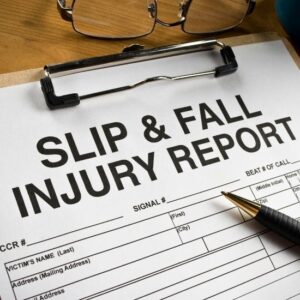Have you been injured in your apartment building because your landlord failed to make necessary repairs in a timely manner? Friction between tenants and landlords regarding maintenance issues is extremely common. Tenants benefit from knowing their rights.
Landlords are required to maintain their properties in good repair. They are required to respond to repair requests in a timely manner. Failure to do so can lead to injury, medical bills, property damage, lost income and emotional distress. Beyond typical “slip and fall” injuries, tenants with unresponsive landlords can pay with their lives for blatant negligence.
Sample Cases – Landlords Often Ignore Maintenance Issues
Residents of an apartment building in Brookhaven, Georgia reported concerns about unstable outdoor metal decks to management. Complaints went unaddressed and In August, 2014 , five people (including 2 children) were injured when a deck suddenly collapsed.
In May of 2019, a 30-year-old man was crushed to death when an elevator in the Manhattan Promenade apartment building suddenly plunged as he was exiting into the lobby. Tenants had complained about the elevators many times; the landlord had also been fined by the city for safety issues.
In Portland, Oregon residents filed a lawsuit seeking $86 million in damages after a tragic apartment fire resulted in two deaths, a 3rd victim severely burned, and a 4th roommate almost trapped July 2021. The fire started after fireworks were thrown into a dumpster located under a wooden skywalk. Victims were suddenly trapped on upper floors when the building was engulfed in flames. Tenants had repeatedly complained about random trash fires in plastic dumpsters located too close to the 1972-era wooden building. The landlord also ignored prior fire department citations.
Landlords Duties To Tenants
In California landlords are required to provide livable, decent housing for tenants under a legal doctrine called the “implied warranty of habitability.” That means your apartment’s heating, water, electrical system and plumbing should be maintained in good working order.
Habitability also includes common areas like stairwells, hallways, shared laundry rooms, gyms, pools and parking areas. Working smoke detectors, fire alarms and sprinklers, functional fire escapes, adequate lighting and building security are additional aspects of potential injury and losses of tenants.
If Your Landlord Does Not Fix Problems
Sometimes repeated requests from tenants for repairs are ignored by landlords, property managers and distant corporate owners, even when repairs might seem quick, easy and cheap.
An example might be a missing or broken handrail in a shared stairwell. Once reported, a diligent landlord will address the problem quickly, and help tenants avoid falls by posting signs and suggesting use of another stairwell. If no repairs are made and a tenant falls and breaks a leg, the landlord could face liability for the tenant’s “assisted accident.”
Document Safety and Habitability Complaints
Keep careful written records of your complaints to management if you have habitability and safety concerns. If you are injured, your documentation will support your damage claim. Remember to distinguish between serious threats (the access control system to your front entry lobby is broken and unauthorized persons are entering the building) and minor issues (a ceiling fan makes a squeaky noise).
Unusual Situations With Landlord Negligence
- Occasionally landlords may maliciously refuse to do repairs to make you move out. This is an illegal breach of the legal duty of care.
- Landlords may delegate repairs to unqualified or unlicensed contractors who may perform the work haphazardly. In this case the landlord’s vendors might share liability if injuries occur to a tenant.
- If your landlord allows you to make repairs on your own and you botch the job and injure yourself as a result, that’s most likely your own problem.
Can You Sue Your Landlord?
Absolutely. You must prove your landlord failed in their duty to provide safe, habitable living spaces, did not make repairs when notified, and caused damage to you or your property. You then have an opportunity to recover compensation for your losses. This could include medical expenses, lost work income and even the capacity to work in the future. Your losses might also include pain and suffering, or permanent disability or disfigurement.
If your landlord acted out of malice by refusing repairs, punitive damages may also be recoverable.
Your personal injury lawsuit against your landlord’s insurance company can sometimes result in appropriate compensation for your losses.


 (415) 533-0735
(415) 533-0735 (415) 843-0496
(415) 843-0496